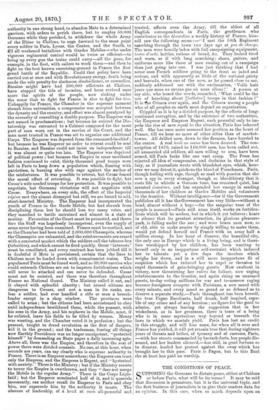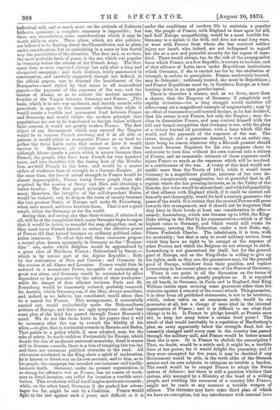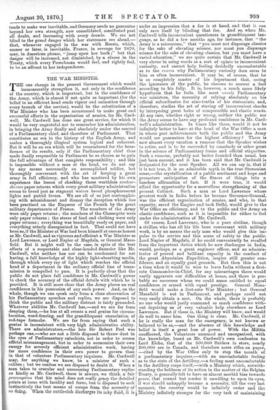THE CONDITIONS OF PEACE.
SUPPOSING the Germans to dictate peace, either at Chalons or before Paris, what will be its terms ? It may be said that discussion is premature, but it is the universal topic, and the first business of journalists is to give their readers data for an opinion. In this case, when so much depends upon an individual will, and so much more on the attitude of Cabinets hitherto quiescent, a complete summary is impossible ; but there are, nevertheless, some considerations which it may be worth while to state. Three plans, which are also policies, are believed to be floating about the Chancelleries, not as plants under consideration, but as embodying in a more or less brutal way the possibilities of the situation. The first, and, as we fear, the most probable basis of peace, is the one which was popular in Germany before the retreat of the French Army. The Ger- mans then, as now, expected victory, but only after a long and chequered campaign ; and their decision, freely announced in conversation, and carefully suggested, though not defined, in the official papers, was to demand the banishment of the Bonapartes—now styled by that name in all semi-official papers—the payment of the expenses of the war, and the cession of Alsace, so as to restore the ancient mountain frontier of the Vosges between Germany and France. This basis, which is in one way moderate, and strictly accords with precedent, is open to the immense objection that while it would create a terrible and permanent feud between France and Germany, and would violate the modern principle that populations are not to be transferred to foreign rulers without their consent, it would not greatly weaken France. The first object of any Government which may succeed the Empire would be to recover French territory, and if at all able or patient, it would either so re-organize France or so bind to- gether the three Latin races, that sooner or later it would recover it. Moreover, all evidence seems to show that although Alsace speaks a patois which is nearer German than French, the people, who have been French for two hundred years, and who therefore felt the fusing heat of the Revolu- tion, are %till French to the bone, and would be a source rather of weakness than of strength to a German Empire. At the same time, the loss of actual strength to France would be almost imperceptible, France losing fewer people than she acquired by the cession of Savoy and Nice, and obtaining a better frontier. The first grand principle of modern diplo- macy, therefore, the integrity of the self-dependent States, would be violated, only to deepen the roots of enmity between the two greatest States of Europe, and make St. Petersburg, when once armed, arbitress between them. That is not a good result, either for Germany or for the world.
Seeing this, and seeing also that their victory, if obtained at all, will be of the completest kind, many Germans begin to argue that it would be better to remodel the map altogether, and, as they must incur French hatred, to reduce the effective power of France till that hatred becomes on ordinary political calcu- lation innocuous. To effect this end, these reasoners propose a second plan, known apparently in Germany as the " Burgun- dian " one, under which Belgium would be aggrandized by a great slice of Northern France ; Switzerland by Savoy,— which is by nature part of the Alpine Republic ; Italy by the restoration of Nice and Corsica ; and Germany by the cession of all Alsace and Lorraine. France would then be reduced to a second-rate Power, incapable of maintaining a great war alone, and Germany would be surrounded by allies dependent on her guarantee for the safety of their territories ; while the danger of firm alliance between Paris and St. Petersburg would be immensely reduced, probably removed, for Austria, which Germany can, if she likes, always conciliate, and, indeed, as we believe, has conciliated, would alone then be a match for France. This arrangement, if successfully carried out, would undoubtedly make the Hohenzollerns arbiters of Europe, and there are ugly symptoms abroad that some plan of the kind has passed through Count Bismarck's mind. We do not like those hints in his papers that it will be necessary after the war to reward the fidelity of his allies,—to give, that is, territorial rewards to Bavaria and Baden. That points to a policy which, if once adopted, may, for the sake of safety, be made ruthless. Fortunately for Europe, which dreads the rise of an almost universal monarchy, there is reason still in German councils, there is a fear of tempting fate too far, and there are enormous political obstacles in the road. All utterances attributed to the King show a spirit of moderation, he is known to detest war on its own account, and to him, as to his people, the campaign has revealed one immense and hardly- foreseen truth. Germany, under its present organization, is as strong for offensive war as France, has no reason of weak- ness to dread invasion, can inflict for invasion a terrible retri- bution. This revelation will of itself inspire moderate counsels ; while, on the other hand, Germany, if she pushed her advan- tages too far, might be met by a Coalition. France would light to the last against such a peace, and difficult as it is under the conditions of modern life to maintain a popular war, the people of France, with England to draw upon for aid, and half Europe sympathizing, would be a most terrible foe. Germany is a nation in the field, and does not want long wars, or wars with Powers from whom she has received neither injury nor insult, who, indeed, are not indisposed to regard her rise as a new and powerful security for the repose of man-- kind. There would always, too, be the risk of the propagandist force which France, as a free Republic, is certain to exercise, and of that alliance of Latin races under Republican institutions. which Germany, if she is carried too far by the exultation of triumph, is certain to precipitate. France, moderately treated, may be Orleanist ; ruthlessly treated, she must be Republican ;. and France Republican must be, in Southern Europe, as a fuse burning down in an open powder-barrel.
There is therefore a chance, and, as we deem, more than a chance, that the Emperor of Germany, if completely and rapidly victorious—for a long struggle would embitter al/y sides—may set a magnificent example of magnanimity; may by an effort of transcendent self-control declare, as he has declared, that his enemy is not France, but only the Empire ; may de- cline to dismember France, and may content himself with the- full and formal recognition that Germany is one, with the glory of a victory beyond all precedent, with a fame which fills the- world, and the payment of the expenses of the war. The- latter, though not a generous demand, is not an unfair one, there being no reason whatever why a Rhenish peasant should be taxed because Napoleon for his own purposes chose to- endeavour to turn him without his own consent into a citizen, of France, and no reasonable estimate of those expenses could- injure France so much as the expenses which will be involved in a continuance of the war. A treaty of this kind would not rankle more than the Treaty of 1815, while it would leave- Germany in a magnificent position, mistress of her own de- stinies, conspicuously unaggressive, but so powerful that in all regions where she has pressing interests, as in the Valley of the- Danube, her voice would be almostfinal ; and with full possibility- of that affiance with England which, if it could be carried out honestly and thoroughly, would for half a century guarantee the- peace of the world. It is certain that the neutral Powers will press, towards this arrangement, and it should not be forgotten that they have in their hands at least one consideration to offer— namely, Luxemburg, which was German up to 1866, the King- Duke sitting in the Diet by his representative—which is of the- highest value to Germany, and which would still retain its autonomy, entering the Federation under a new Duke, say, Prince Frederick Charles. The inhabitants, it is true, wish for neutrality ; but that is only to avoid military service, from. which they have no right to be exempt at the expense of other Powers, and which the Belgians do not attempt to shirk.. Luxemburg is not guaranteed for itself, but for the general good of Europe, and as the King-Duke is willing to give up his rights, such as they are, the guarantors may, for the general good of Europe, withdraw from their position, and replace Luxemburg in her recent place as one of the States of Germany.
There is one point in all the discussion on the terms of peace which, we confess, greatly perplexes us. It is repeated- on all hands, in Germany, in Paris, and in England, that King- William insists upon securing some guarantee other than his victories against a renewal of the recent attack. This guarantee,. it is clear from all published statements, is not to be territory, which, unless taken on an enormous scale, would be no- guarantee at all, but a change of some kind in the internal organization of France ; and it is difficult to see what that change is to be. Is France to pledge herself, as Prussia once- did, to keep her army below a certain fixed point I The- result of that would inevitably be a repetition of Hardenberg's. plan, an army apparently below the strength fixed, but in- cessantly changed until every man in the country has passed. through the military mill, and France would be better armed than she is now. Or is France to abolish the conscription f That, no doubt, would be a subtle and, it might be, a terrible blow at her power, for it would delight the peasantry, and if they were exempted for five years, it may be doubted if any Government would be able, in the teeth alike of the German armies and its own subjects, to reimpose so terrible a burden. The result would be to compel France to adopt the Swiss system of defence; but there is still a question whether that system, ably managed by a Ministry at the head of a willing people, and wielding the resources of a country like France, might not be made at any moment a terrible weapon of offence. The Germans may have some third plan of which we have no conception, but any interference with internal laws
tends to make war inevitable, and Germany needs no guarantee beyond her own strength, now consolidated, manifested past all doubt, and increasing with every decade. We are not blind to the grand danger which her statesmen see ahead,— that, whenever engaged in the war with Russia, which, sooner or later, is inevitable, France, in revenge for 1870, may, in American phrase, " jump upon her back ;" but that danger will be increased, not diminished, by a clause in the Treaty, which every Frenchman would feel, and rightly feel, to be an affront to her independence.
































 Previous page
Previous page